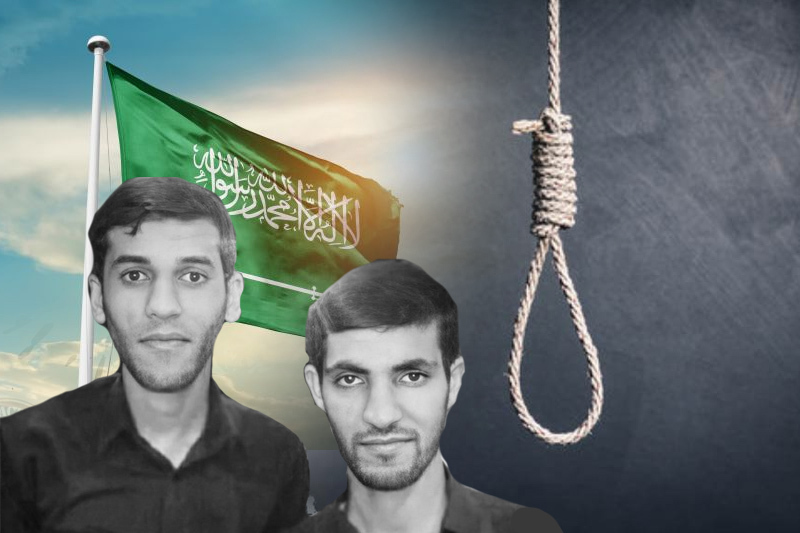

grossly unfair trial leads to execution of bahraini shi'a men in saudi arabia
In a case that has raised concerns over human rights violations, two Bahraini Shi’a men, Jaafar Sultan, and Sadeq Thamer, were executed in Saudi Arabia following a trial that Amnesty International described as “grossly unfair.” The trial took place in Saudi’s Specialized Criminal Court, notorious for its handling of protest-related charges under the country’s counterterrorism law. The execution of Sultan and Thamer highlights the ongoing use of broad and vague provisions within terrorism laws to suppress dissent and target religious minorities in Saudi Arabia and other Gulf Cooperation Council (GCC) countries.
Jaafar Sultan and Sadeq Thamer were arrested in May 2015 and held incommunicado for over three months, according to Amnesty International. They were accused of smuggling explosives into Saudi Arabia and participating in protests in Bahrain. The charges were brought against them under Saudi Arabia’s counterterrorism law, which allows for the use of catch-all provisions to punish peaceful dissidents, political activists, and human rights defenders.
Saudi Arabia’s Shi’a Muslim minority has long faced systemic discrimination and has been the target of state-funded hate speech. Despite promises to curtail executions, Saudi authorities executed 81 men on March 12, 2022, with 41 of them belonging to the Shi’a Muslim minority. This disproportionate targeting of Shi’a individuals raises serious concerns about religious discrimination and unequal treatment within the Saudi justice system.
Similarly, Bahrain’s Shi’a majority also experiences discrimination. The Bahraini authorities have frequently targeted Shi’a clerics and have violently arrested numerous human rights defenders with Shi’a backgrounds. For instance, Abdulhadi al-Khawaja, a prominent human rights activist, was sentenced to life in prison in a mass trial under Bahrain’s terrorism law in April 2011.
The issue of overbroad terrorism charges is not confined to Saudi Arabia and Bahrain. Other GCC countries, such as the United Arab Emirates (UAE), have also exploited such provisions to suppress dissent and target critics of the government. The case of Khalaf Abdul Rahman al-Romaithi exemplifies this. He was sentenced to 15 years in prison on terrorism charges following a grossly unfair trial known as the “UAE94” mass trials, which involved 94 critics of the Emirati government. Al-Romaithi was recently extradited from Jordan to the UAE, adding to concerns about due process violations.
Human Rights Watch has documented longstanding violations of due process and fair trial rights within Saudi Arabia’s criminal justice system. These concerns raise doubts about whether Jaafar Sultan and Sadeq Thamer received a fair trial leading up to their execution. Human Rights Watch opposes the death penalty in all countries and under all circumstances, considering it a cruel and inhumane punishment.
The execution of Jaafar Sultan and Sadeq Thamer, two Bahraini Shi’a men, following a grossly unfair trial in Saudi Arabia sheds light on the ongoing abuse of terrorism laws to suppress dissent and target religious minorities in the GCC region. Saudi Arabia’s Shi’a Muslim minority and Bahrain’s Shi’a majority continue to face discrimination and violations of their human rights. The exploitation of overbroad terrorism charges extends beyond these countries, as seen in the UAE’s “UAE94” mass trials. It is imperative for international human rights organizations and the global community to address these systemic issues, advocate for fair trials, and work towards the abolition of the death penalty in all circumstances.
The DAX market is projected to begin the day without significant movements on Thursday, March 20, 2025. The markets of…
February’s employment data from Australia revealed surprising weakness with employment decreasing by 52,800, after a trend of strength. In terms…
All in all, the impacts of artificial intelligence and automation on job security have raised wide-spread concerns and discussions. With…
According to Angelique Renkhoff-Mücke the business landscape in the United States became less attractive for foreign investors when former President…
During the 2025 Game Developer Conference in San Francisco, the United Videogame Workers Union officially launched on Wednesday as a…
Google has agreed to pay $28 million to settle a class-action lawsuit that accused the tech behemoth of sending better…
This website uses cookies.
Read More